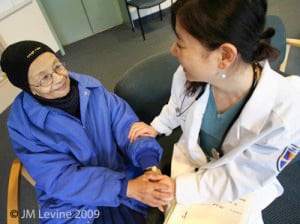 In April 2008 a report entitled Retooling for an Aging America: Building the Health Care Workforce was released. This study was commissioned by the Institute of Medicine (IOM) and put together by the Committee on the Future Health Care Workforce for Older Americans chaired by John W. Rowe. The document presents an analysis of America’s health care workforce regarding care of the elderly and presents a grim picture of a fractured system with inadequate training, personnel, and public financing. Despite the stature of its authors, reviewers, and publishers this study has had minimal impact on educational systems, funding initiatives, and healthcare reform debates.
In April 2008 a report entitled Retooling for an Aging America: Building the Health Care Workforce was released. This study was commissioned by the Institute of Medicine (IOM) and put together by the Committee on the Future Health Care Workforce for Older Americans chaired by John W. Rowe. The document presents an analysis of America’s health care workforce regarding care of the elderly and presents a grim picture of a fractured system with inadequate training, personnel, and public financing. Despite the stature of its authors, reviewers, and publishers this study has had minimal impact on educational systems, funding initiatives, and healthcare reform debates.
The following is a partial list of IOM findings:
- Our country is facing an impending health care crisis with increasing numbers of older patients with complex health needs.
- America has a health care workforce that is too small and critically unprepared to meet the health needs of this population.
- More health care providers need training in the basics of geriatric care.
- To attract and retain competent geriatric specialists there must be increased salaries and wages, and exploration of alternative models of care
- Training programs need to be set up for informal caregivers, including family members, friends, and others who have a substantial role in delivering community based care.
Nearly two years after release of this report, attention to the critical issues raised has hardly trickled into the public arena. This lack of impact has recently been addressed by Chris Langston, program director at the Hartford Foundation, one of the supporters of the report. Mr. Langston points out that that the political impact, dollars spent, and penetration of the issues in to the public debate since the report’s release have been minimal.
There are many negative outcomes that result directly from a medical system inadequately attuned to the needs of the elderly. Old people require time – for listening, information gathering, medication review, examination, and counseling. In a system which forces physicians to increase numbers of visits to support office overhead, time is not an available commodity. Physicians with financial incentive to hospitalize and perform procedures will not consider palliative care approaches which prevent suffering and reduce costs. Caregivers not attuned to complex physiologic changes associated with age can easily induce medication related side effects with prescription drugs. Common geriatric syndromes such as sensory loss, pressure ulcers, malnutrition, incontinence, falls and others will go unaddressed. Inefficient and poorly coordinated care allows vulnerable elderly people and their medical problems to fall through the cracks.
The IOM report warned that our health care workforce is unprepared for the increasing demands of our aging population, and concluded that our system requires immediate change. Since its release there has been little discussion of these issues in the public debate on healthcare reform. Until principles of informed and intelligent care of the elderly are incorporated into medical education and our systems of care, we will continue to see accelerated costs related to poor outcomes, inappropriate treatments, and dissatisfaction expressed by caregivers and patients. Hopefully our political leaders will catch on to this trend and bring the issues into the national arena where they should be.
* * * * * * * * * * * * * * *
See related post: Recertification in Geriatric Medicine Completed.
To access all posts on geriatric medicine click here.
